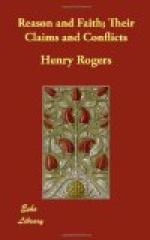It is the same with the doctrine of the Divine government of the world. In ordinary states of mind man counts it an absurdity to suppose that the Deity would have created a world to abandon it; that, having employed wisdom and power so vast in its construction, he would leave it to be the sport of chance. He feels that the intuitions of right and wrong; the voice of conscience; satisfaction in well-doing; remorse for crime; the present tendency, at least, of the laws of the universe,—all point to the same conclusion, while their imperfect fulfilment equally points to a future and more accurate adjustment. Yet let the man look exclusively for awhile on the opposite side of the tapestry; let him brood over any of the facts which seem at war with the above conclusion; on some signal triumph of baseness and malignity; on oppressed virtue, on triumphant vice; on ’the wicked spreading himself like a green bay tree;’ and especially on the mournfull and inscrutable mystery of the ‘Origin of Evil,’ and he feels that ‘clouds and darkness’ envelope the administration of the Moral Governor, though ’justice and judgment are the habitation of his throne.’ The evidences above mentioned for the last conclusion are direct and positive, and such as man can appreciate; the difficulties spring from his limited capacity, or imperfect glimpses of a very small segment of the universal plan. Nor are those difficulties less upon the opposite hypothesis: and they are there further burdened with two or three additional absurdities. The preponderant evidence, far from removing the difficulties, scarcely touches them,—yet it is felt to be sufficient to justify faith, though most abundant faith is required still.




